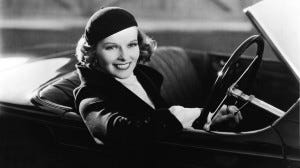Christopher Strong | Horny on Main
The funniest thing about Dorothy Arzner’s 1933 film for RKO, Christopher Strong, is its name. The title character is played by Colin Clive, whose charm belies his emptiness, and reveals Arzner and writer Zoë Akins’ ploy at making him the purported centre of the film’s universe. He is less a person than a point around which the res…
Keep reading with a 7-day free trial
Subscribe to Cinema Year Zero to keep reading this post and get 7 days of free access to the full post archives.





